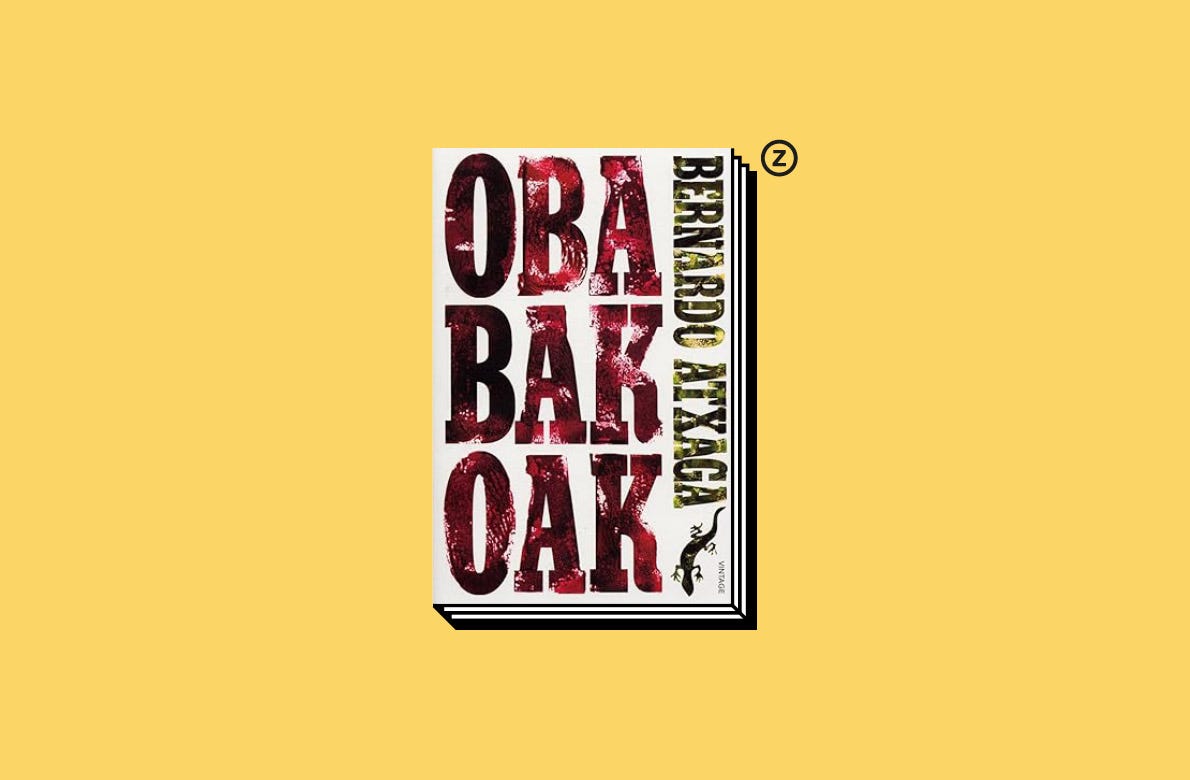Having written professionally for nearly two decades now, I think the title of this piece might be my greatest work.
It took me longer than it should, but I finally figured out that “Tx” in the Basque language of Euskara is pronounced “Ch” and thus my masterpiece title.
Genius, right?
More so, because Bernardo Atxaga—in writing Obabakoak—is indeed the cheekiest of monkeys.
I’ll elaborate on why that is here in this piece of elaboration.
(Side note: I’m so fed up with everything being described as “content” that I’m going to personally replace the word in my psyche with “elaboration” so that whenever I hear some empty-minded like-hungry guff-spiller declare, yah, I just posted some new content, I’ll hear, yes, I just posted some new elaboration. It wouldn’t necessarily be a better world, but it would be a different world. A more elaborate world. Anyway…)
Wherever I travel, I aim to read something relevant to the place.
A few days driving from Santander to San Sebastian (via Bilbao and Gernika) meant only one thing:
I needed something related to the Basque Country.
Aside from a plethora of food-based fare, which was the main suggestion when it came to Googling “Basque books,” the main fiction option was Dave Boling’s novel Guernica. It’s a good book, but I already read that a few years back.
Digging a little deeper, I came across this Bernardo Atxaga chap and found him to be one of the only “famous” writers who’ve written in the Basque language—Euskara—over the last four centuries.
Specifically, I spied this book/novel/story-collection, Obabakoak, which—quick lesson in Euskara—roughly translates as The People/Things of Obaba.
Obaba, then, is a place: a fictionalised village in the Basque Country.
And Obabakoak is a book of stories about the people and things from that place.
Hastily fanning its pages (as I stuffed it into my backpack), it looked a pretty dense book and, given I was only in Spain for five days (and was meant to be doing some sightseeing too), I figured it would last me.
It didn’t.
A few hours on the plane and then a few hours gobbling it up on my first day “sat off” in the Bilbao sun, and I was done.
More to the point, I had a new literary love.
The best books have no time
What makes it so readable?
What makes Atxaga so cheeky?
Partly, it’s because my expectations were relatively low (which is interesting in itself, but for another time).
In truth, I didn’t know what to expect. Aside from the blurb, I’d read no preamble about the book.
I expected it to be old-fashioned stories. A bit fairytale, maybe. Brothers Grimm or something. Not bad, but not really my bag. The worst I anticipated was something dense and dour in the Hardy/English Literature A-level mode, but in Spanish. I expected something that’s probably aged a bit too, and is probably more relevant to Spanish readers aware of the complicated history of the Basque region.
I was wrong.
Pretty quick into the book, I realised I was reading the Basque Borges, or (for want of needless, inaccurate, and questionable alliteration) the Iberian Italo.
It’s quirky. It’s clever. It’s cheeky.
It’s meta as hell, which is always good for a post-modern boy like me.
And it’s got a timeless quality to it that I think all the best literature seems to have in common.
It’s like when you read The Glass Bead Game, or The Name of the Rose, or The Trial for the first time and think: when the eff was this written?
Obabakoak was written in 1989, but could have been written in 1889 or 2009.
It feels new. It feels old. It feels like some kind of pure literature, some kind of ur-literature, way beyond so much of the weary and self-conscious gas that gets published today.
I’m not going to tell you why it’s so cheeky. Or in what way it plays out on a meta-level.
I’m not going to tell you why it’s so readable and why it defies expectations (given it was originally written in a pretty impossible-to-decipher language).
And I’m not going to tell you why this sentence is here because of the two previous sentences, which in some small way reflects how some of the stories in this book work together.
Instead, I’ll just tell you to read it.
If you like interesting and original literature and you’ve not come across Bernardo Atxaga before (or this strange and singular book), get it on the TBR and R it ASAP.
My recommendation: I mean, obviously, the setting of Bilbao’s old town was perfect for reading this: nipping in and out of bars, nibbling on pintxos, drinking Txacoli from a great height in the cobbled, labyrinthine streets. If you can, visit the place yourself and take this book with you. But don’t not read it because you have no plans to bask (sorry) in the bright sun of the Basque Country. If you’re a fan of Borges, of Calvino, of Georges Perec et al, give this a spin and you’ll be glad to have discovered another fellow traveller in the literature of the playful.





